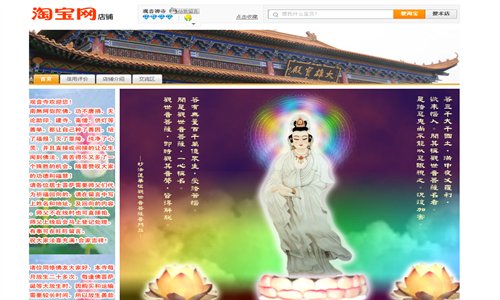
 |
| This screen grab shows an online store offering mercy release services. Photo: GT |
On a cloudy day in May, several monks stood beside a river at Mt Jiuhua, Anhui Province, chanting Buddhist classics as fish, turtles and snakes made their way from cages and aquariums to freedom in the river and grasslands beyond.
Freeing animals like this is a practice familiar to many Buddhists around China. It is an affirmation of mercy and treasuring life, explained a woman surnamed Li, who declined to give her first name.
Li, a 40-year-old Buddhist who lives in Guangdong Province, has found it difficult to keep up the practice given her busy working schedule. She has found a solution however - outsourcing it to temples via the Internet.
The Global Times earlier reported that temples in different provinces in China have started selling "mercy release" services via Taobao, a popular e-commerce platform. Temples post mercy release schedules, listing various prices for different species they are considering releasing.
The stores seemingly have a good reputation, with positive comments across the board, but some former customers warn of fake temples whose online stores vanish overnight. Others have also questioned whether merely clicking a mouse can truly represent a spiritual activity.
A history of mercy
For a mercy release on July 28, Li paid 100 yuan ($16.29) to a temple's online store, named Puguang, to release fish and other animals in Hebei Province. As of press time, there were 1,311 customers who had purchased this specific mercy release package in the previous 30 days.
Although the customers pay to release certain species, that money is not used by the temples to purchase those specific species, a store operator told the Global Times. Instead, they visit wet markets and see what they can buy on that particular day.
The number of animals released is determined by how much money they have collected.
Chengwu, a monk in charge of running an Anhui-based temple store on taobao.com, told the Global Times that they started to offer mercy release services to the public when they launched their online store in 2011.
Another temple abbot in Beijing, who requested anonymity, said that not all temples have suitable locations for mercy release activities as some of them are in cities and are not close to rivers or wilderness.
Chengwu said that each month they raise about 10,000 yuan from people who purchase release services, which covers the cost of animals and related costs, while there is sometimes "several hundred" yuan left over. The Beijing abbot, on the other hand, said that all the money they collect is used to purchase animals.
Copycat services
A former customer, surnamed Yuan, from Beijing, told the Global Times that he had been cheated by some fake temple stores online. "They took our money and then vanished from the commercial platform."
Stores reached by the Global Times said that they post pictures and videos online to try to bolster their credibility.
Despite this, Yuan and some other Buddhists reached by the Global Times via various forums, said that not all stores can be trusted, a view backed by one store operator in Beijing.
Zhang Lei, a staff member from the public relations department of Taobao, told the Global Times that if temples wish to sell these services, they should provide a valid certificate to clarify that the temple is real. Chengwu backed this view, saying these certificates are a must. He also pointed out that it's a new service. "We are not even sure how many there are," he said. "If they increase in number, we will definitely need more supervision over them in the future."
Cheng Gongrang, a Chinese cultural studies professor at Nanjing University, who is also a Buddhist, told the Global Times that these businesses may have a bright future as people have come to rely on the Internet, but said that supervision in this area was required.
"This kind of online service doesn't have sufficient supervision from related authorities and most of the customers might have not visited the temple in person before," he said. "This makes it hard to find out whether these stores are actually spiritual or just used by someone to make money," he said.
Master Zongxing, a deputy head of the Buddhist Academy of China, told the Global Times that government authorities should take charge of supervising these businesses, instead of religious affairs departments.
Packaged spirituality
Abbot Mingzang, of the Chaoyang Temple in Beijing, told the Global Times that he was strongly opposed to these services. "Many people aren't involved in these releases because they want to save lives, often they just want to make wishes and ask for good fortune," he said. "This goes against the principles of the religion and damages its reputation."
Similarly, Yu, a customer who once purchased a mercy release service online, told the Global Times that while Buddhist poems and mercy release activities provide him with spiritual satisfaction, it was not a good idea to offer these services online as they detract from the solemnity of the practice.
"I realized that if I really want to take these Buddhist activities seriously, I should not just use online release services by merely clicking a mouse and giving some money. Instead, I should attend in person even if it is difficult to reach those temples," he said. "Those difficulties during the journey teach me more than the releasing activity itself."
However, not all agree. Li tried her first mercy release in January this year, after some of her friends with the same beliefs suggested it. "Using the Internet, one can be involved in more than one release at the same time, which sets more animals free and improves our karma," Li said, adding that she trusts certain stores because her friends have used them.
"It's a bit like those who donate to charity organizations. We are donating to Mother Nature to treasure these lives," Li told the Global Times, while adding that she also post positive wishes on the sales page, with one stating, "I hope the Buddha blesses my daughter to give her a good mark in the coming national college entrance examinations."
















 1 killed in SW China helicopter crash
1 killed in SW China helicopter crash


![]()
